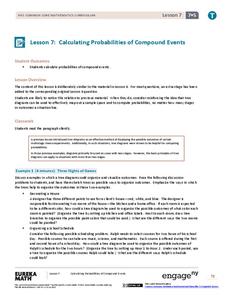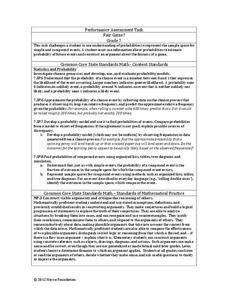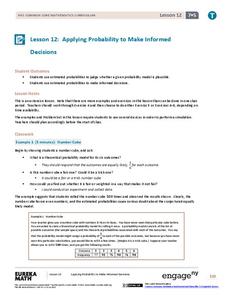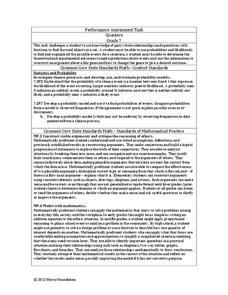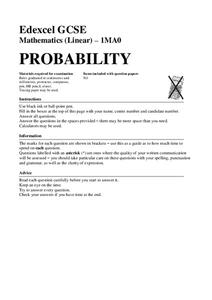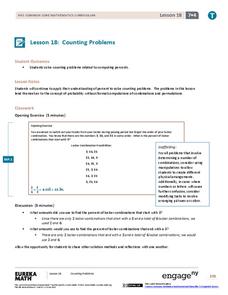EngageNY
Calculating Probabilities of Compound Events
Use tree diagrams with multiple branches to calculate the probabilities of compound events. Pupils use tree diagrams to find the sample space for probability problems and use them to determine the probability of compound events in the...
E Reading Worksheets
Summarizing Text
Help learners find the most important information in a text with a lesson on summarizing. As kids read through a passage about Johannes Gutenberg, they summarize small excerpts, put events in sequential order, and respond to two longer...
EngageNY
Conducting a Simulation to Estimate the Probability of an Event
How can you complete a simulation when it is not practical to determine the probability of an event? Class members learn that in some situations, it is not feasible to find the probability of an event, but they can estimate it by running...
IPA Productions
A Christmas Carol - The Story
Thirty-six pages familiarize scholars with the story and vocabulary of A Christmas Carol by Charles Dickens. After reading and listening to an abbreviated version of the holiday tale learners show what they know about the sequence...
Noyce Foundation
Fair Game?
The game should be fair at all costs. The mini-assessment revolves around the ability to use probabilities to determine whether a game is fair. Individuals determine compound events to calculate simple probabilities and make...
EngageNY
Chance Experiments with Outcomes That Are Not Equally Likely
The fifth portion of the 25-part series introduces probabilities calculated from outcomes that are not equally likely. Class members use tables to calculate probabilities of events, add outcome's probabilities, and find...
EngageNY
Chance Experiments with Equally Likely Outcomes
Take a deeper dive into equally likely probabilities. Pupils build upon their understanding of probability by determining sample spaces and outcomes. Individuals work with sample spaces and determine outcomes that are equally likely....
EngageNY
Calculating Probabilities for Chance Experiments with Equally Likely Outcomes
Calculate theoretical probabilities and compare them to experimental probabilities. Pupils build on their knowledge of experimental probabilities to determine theoretical probabilities. Participants work several problems with the...
EngageNY
Mid-Module Assessment Task: Grade 7 Mathematics Module 5
Determine the probability that the class knows probability. The three-question assessment presents problems with finding the sample space and the probability, theoretical and experimental, of a variety of situations. Pupils also describe...
EngageNY
Applying Probability to Make Informed Decisions
Use simulations to determine the probabilities of events to make decisions. Class members are presented with several scenarios, some with known probabilities and others without. Groups run simulations to gather data that they then...
EngageNY
Conducting a Simulation to Estimate the Probability of an Event II
Add some randomization into simulations. The 11th installment in a series of 25 presents two new methods to use in simulations--colored disks, and random numbers. Pupils use random numbers to run simulations where the probabilities make...
New York State Education Department
Global History and Geography Examination: June 2010
Using a set of primary source documents, such as descriptions of climate phenomena and images of weather events, pupils consider how climate shapes history. A second essay prompt and multiple-choice questions with documents engage...
Curated OER
ESL Vocabulary Quiz-Historical Events
In this ESL vocabulary activity students fill in blanks to complete sentences about historical events. Students may click on an answer button for immediate feedback.
Illustrative Mathematics
Waiting Times
Probability prevails in this assignment as youngsters determine the probability of finding a blue pen in a cereal box when they can come in blue, green, yellow, or red. Learners set up a simulation to determine the outcome of compound...
Noyce Foundation
Counters
For some, probability is a losing proposition. The assessment item requires an understanding of fraction operations, probability, and fair games. Pupils determine the fractional portions of an event. They continue to determine whether...
Curated OER
Breakfast Before School
Are the events "I eat breakfast" and "I am late for school" independent events? Assess learners' understanding of independence in a simple context with this short instructional activity. Use as an opener, as part of an assignment, or...
Curated OER
The Titanic 2
Did the rescue procedures on the Titanic favor the first-class passengers? Use actual historical data to explore independent and dependent events with your class. Part of a series of worksheets, but can be used separately.
Curated OER
Alex, Mel, and Chelsea Play a Game
This short probability question may look simple at first, but it is actually quite complex! Learners must understand independent events in context and must take into account several different scenarios. Use as an individual assignment...
Curated OER
Sitting across from Each Other
What is the probability that two randomly seated people will be across from each other at a square table? Check learners' understanding of theoretical probability and compound events with this short assessment. A great opportunity to...
Mathed Up!
Probability
How likely is it to draw a blue marble? Pupils find the likelihood of events and connect that to the probability of the event. They find the probabilities of simple events and show their probabilities on a scale.
Mathed Up!
Probability and Relative Frequency
Go ahead and take a chance. Given the probability of an event, scholars determine the frequency of the event out of a sample. The part of a review series for the General Certificate of Secondary Education math assessment asks classmates...
EngageNY
Counting Problems
Solving these percent problems is a matter of counting. Pupils find percents by counting the number of events that meet the criteria and the total number of possibilities. Participants create the ratio and convert it to a percent to...
EngageNY
Mid-Module Assessment Task: Grade 6 Math Module 2
Make sure scholars know all about fractions and decimals — not just a fraction of the information. The 12th installment of a 21-part series is a mid-module assessment. Learners solve problems in the context of a birthday party and a...
Livaudais-Baker English Classroom
Kindred Reading Quizzes
Three quizzes are designed to assess readers' knowledge of events in Octavia E. Butler's Kindred. All questions are fact-based rather than asking readers to infer or interpret the text.
Other popular searches
- Current Events
- Sequence of Events
- Sequencing Events
- Compound Events
- Current Events Newspaper
- Field Day Events
- Chemistry Current Events
- Current Events Rubric
- Independent Events
- Teaching Current Events
- Africa Current Events
- Health Current Events
